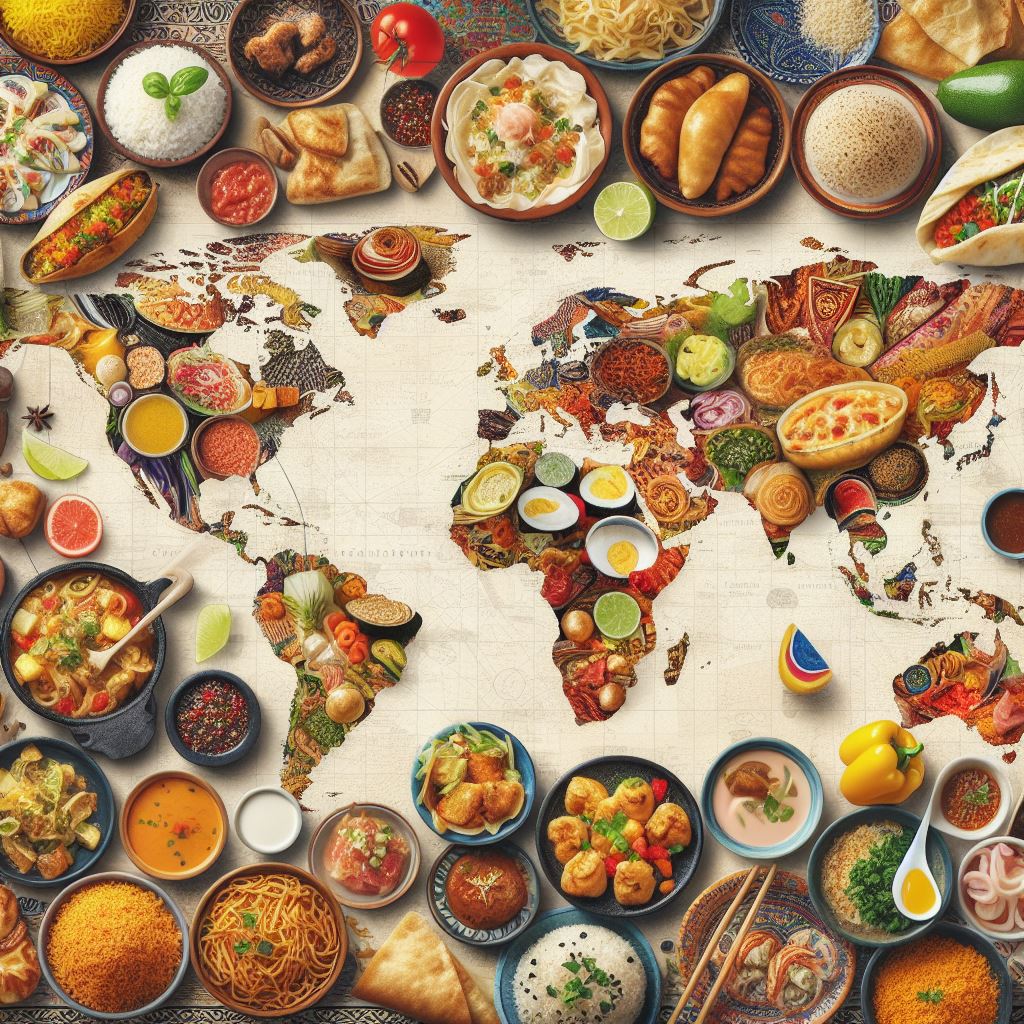Discovering the Culinary Diversity of New Locations

One of the most exciting parts of exploring a new area is diving into its culinary scene. Honestly, savoring local cuisine can be as adventurous as zip-lining in Costa Rica or as comforting as a warm hug from your grandma. If you’re keen on discovering local eateries, embracing regional dishes, and even shaking things up in your own kitchen, you’re in the right place.
The first step in your culinary exploration is developing a genuine appreciation for local cuisine.
Forget the chains you’re familiar with for a moment. Local eateries are treasure troves of authentic flavors and traditional dishes. But, finding the best spots requires a bit of detective work. Here’s a pro tip: chat up locals. Engaging with them can lead you to hidden culinary delights that you won’t find in tourist guides or mainstream dining recommendations.
A quick online search can be a valuable tool in uncovering local gems. Many food bloggers and reviewers often highlight lesser-known eateries that offer exceptional dishes. Social media groups dedicated to foodies in your area are also great resources. Members of these groups are passionate about food and are eager to share their favorite spots and recommendations.
When exploring local eateries, don’t be afraid to step out of your comfort zone. Trying new dishes and flavors is a part of the adventure. You might discover a new favorite dish or cuisine that you wouldn’t have encountered otherwise. Plus, supporting local businesses contributes to the community’s economy and helps to preserve the unique culinary culture of the area.
Food Markets and Street Food
There’s no better place to immerse yourself in the local food scene than at food markets and street food stalls. These bustling spots offer a kaleidoscope of flavors, ingredients, and dishes unique to the area. From freshly caught seafood to locally sourced fruits and vegetables, food markets showcase the region’s best produce and culinary traditions.
Exploring food markets allows you to engage directly with local vendors and farmers, gaining insight into the origins of the food and the stories behind the dishes. It’s a fantastic way to support the local economy and appreciate the efforts of those who work hard to provide fresh and authentic food to the community.
Street food stalls, on the other hand, offer a more casual and spontaneous dining experience. You can watch as skilled vendors prepare dishes right in front of you, often using age-old recipes and techniques passed down through generations.
Food markets and street food stalls are excellent places to discover hidden gems and lesser-known dishes that may not be found in traditional restaurants. The diversity and variety of food available often reflect the cultural melting pot of the region, offering a rich and flavorful dining experience that caters to all tastes and preferences.
Regional Dishes
Some regional specialties might seem intimidating at first glance. But, remember, culinary adventures are all about discovery.
Stepping out of your comfort zone and trying new foods can lead to delightful surprises. You might discover unique flavors and textures that you never knew you loved. Plus, it’s an opportunity to learn more about the cultural and historical significance of different dishes and ingredients, deepening your understanding and appreciation of the local food scene.
When venturing beyond your comfort zone, it’s helpful to keep an open mind and approach each new culinary experience with curiosity and enthusiasm. Engage with locals and vendors to learn more about the dishes you’re trying and the best ways to enjoy them. You might find that a dish you were initially hesitant to try becomes a new favorite that you crave long after your trip is over.
Participating in Local Cooking Classes
Want to dive deeper into the local food scene? Check out local cooking classes. It’s a fun and interactive way to learn about the culinary traditions of the area directly from the experts—local chefs and home cooks.
Local cooking classes provide a hands-on experience, allowing you to learn new cooking skills and techniques that you can take home with you. You’ll have the opportunity to prepare and cook traditional dishes under the guidance of experienced instructors, ensuring that you create authentic and delicious meals. Plus, at the end of the class, you get to enjoy the fruits of your labor by eating what you’ve made.
Participating in cooking classes is a great way to immerse yourself in the local culture and connect with like-minded food enthusiasts. You’ll have the chance to interact with locals, share culinary experiences, and gain a deeper appreciation for the rich culinary heritage of the region.
Unleashing Your Inner Chef: Experimenting with Home Cooking
After tasting all that a new location has to offer, why not bring those flavors into your own kitchen?
Shop Local, Cook Fresh
Visit local farmers’ markets and grocery stores to stock up on regional produce and ingredients. Cooking with fresh, locally sourced ingredients is a key element in creating authentic and flavorful dishes that capture the essence of the local cuisine.
When you shop local, you’re supporting local farmers, producers, and artisans. This direct connection to the source of your food adds a special dimension to your cooking experience, allowing you to appreciate the seasonality and diversity of the region’s produce.
Exploring farmers’ markets and local grocery stores can also be a great way to discover new and unique ingredients that you may not find in your regular supermarket. From heirloom varieties of fruits and vegetables to artisanal cheeses and locally produced spices, these markets offer a treasure trove of culinary delights waiting to be discovered and incorporated into your cooking.
Shopping local and cooking fresh enables you to experiment with traditional recipes and create your own interpretations of classic dishes. You’ll have the freedom to be creative in the kitchen while staying true to the flavors and techniques that define the local cuisine.
Recreate and Innovate
Start by trying to recreate some of the dishes you’ve fallen in love with during your culinary adventures. Pay close attention to the flavors, textures, and techniques used in the traditional recipes.
Recreating dishes is a great way to hone your cooking skills and gain a deeper understanding of the flavors and ingredients that define the local cuisine. It allows you to practice and perfect traditional cooking techniques while appreciating the authenticity and heritage of the dishes you’re preparing.
Once you feel confident in your ability to recreate traditional dishes, don’t be afraid to get creative and innovative in the kitchen. Experiment with different ingredients, spices, and cooking methods to put your own unique twist on classic recipes. Who knows? You might come up with a fusion dish that’s all your own—a delicious blend of traditional flavors and contemporary culinary creativity.
Dietary Restrictions
Adventuring into new culinary territories can be daunting, especially if you have dietary restrictions. But don’t fret! Here’s how to navigate these waters:
Before the local food scene, a little research goes a long way in ensuring a smooth and enjoyable culinary experience. Familiarize yourself with the regional cuisine, popular dishes, and local dining customs to better understand what to expect and how to navigate menus.
Learning key phrases in the local language can be incredibly helpful in communicating your dietary needs and preferences to restaurant staff and vendors. Basic phrases related to allergies, dietary restrictions, and food preferences can go a long way in ensuring that you can enjoy your meals safely and comfortably.
Remember when we talked about chatting up locals? Well, they can also offer valuable insight into which eateries cater to specific dietary needs. Locals often have firsthand knowledge of the best places to dine for various dietary preferences, and their recommendations can be incredibly helpful in finding restaurants and eateries that can accommodate your needs.
Engaging with locals provides an opportunity to learn about the dining options that are suitable for your dietary restrictions.
In addition to connecting with locals in person, local online forums and social media groups can be invaluable resources for finding information about restaurants and eateries that cater to specific dietary needs. These online communities often feature discussions, reviews, and recommendations from local residents and fellow travelers who share their dining experiences and tips for navigating the local food scene.
Culinary Adventures as a Way of Life
Documenting your culinary adventures is a wonderful way to preserve memories and create a lasting record of your gastronomic journey. Keeping a culinary journal allows you to track the dishes you’ve loved, the recipes you want to try at home, and the places you want to revisit in the future.
In your culinary journal, you can jot down detailed descriptions of the dishes you’ve tried, noting the flavors, ingredients, and cooking techniques that made them stand out. You can also make notes about the restaurants, eateries, and street food stalls where you enjoyed these memorable meals, along with any recommendations or tips from locals or fellow travelers.
A culinary journal is a great place to collect recipes that you’ve discovered and want to recreate at home. You can write down the ingredients, measurements, and cooking instructions, and even add your own personal notes and variations to tailor the recipe to your taste.
Over time, your culinary journal will become a valuable resource filled with culinary inspiration, cherished memories, and a collection of tried-and-true recipes and recommendations. It can serve as a guide for future travels, helping you remember the dishes and dining experiences that made a lasting impression and inspiring you to continue exploring and experimenting with new flavors and cuisines.
Embracing a curious and open-minded approach to food allows you to venture beyond your comfort zone, try new flavors and dishes, and experience the diverse and dynamic world of global cuisine. It encourages you to be adventurous in your culinary explorations, to experiment with different ingredients and cooking techniques, and to appreciate the creativity and innovation that are integral to the evolution of food and cooking.
Staying curious and open-minded fosters a deeper understanding and appreciation of different cultures and traditions through their food. It encourages you to learn about the history, heritage, and significance of various dishes and ingredients, and to engage with the stories and experiences that shape the culinary landscape of different regions and communities.
Other posts
© 2024 Local Movers. All rights reserved.
